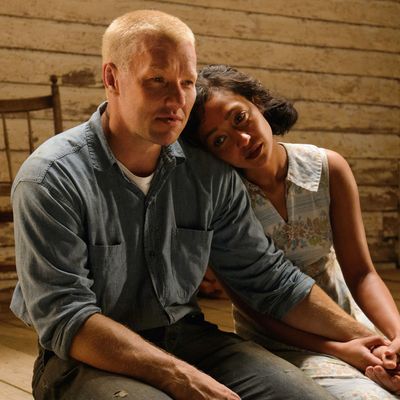
Jeff Nichols’s hushed, intense film Loving is named for the mixed-race couple Richard and Mildred Loving, whose 1958 arrest in Caroline County, Virginia, would lead, a decade on, to the abolition of miscegenation laws in a raft of states. But by all means feel free to read something else into that title. The movie opens with the pair (Joel Edgerton and Ruth Negga) on a porch. She tells him she’s pregnant and, a little later, he asks her to marry him. Their manner with each other is tender, easy — like falling off a log. Richard, who’s white, has lived around black people his entire life, and he doesn’t seem to brood on — or even fully register — the difference between them. The county sheriff (Marton Csokas) explains that what Richard’s doing is not God’s way, that when you mix things up, “blood doesn’t know what it wants to be.” But Richard knows he loves her, and how could something natural be wrong?
Nichols has made his share of showy movies. His last one, Midnight Special, was a Spielbergesque odyssey about a father’s crusade to save a mystical child. But in Loving, he pares down his technique and stretches out his pace. Things move slowly, like Richard Loving himself. We wait for him to formulate his few words while staring at Edgerton’s near-impassive face, trying to discern his thoughts. The actor is barely recognizable, his blond hair buzzed to square off his head, his eyes hooded, his neck sunk low into his broad shoulders. Negga, a slender, Ethiopia-born actress with large, vivid eyes, plays Mildred as someone who waits for him, too, deferring to his rhythms. But it’s Mildred who — having been driven out of Virginia and forced to live with Richard and three children in an ugly part of Washington, D.C., a world away from the Mall on which Martin Luther King speaks to men and women still burdened by slavery’s legacy — writes the letter to Robert Kennedy that will be forwarded to the American Civil Liberties Union and that will turn the reticent Lovings into a powerful symbol of racial injustice.
Have I mentioned the pacing? I can’t say enough how unusual it is in an American film to experience time this way, at a crawl bordering on a standstill. The silence is heavy, ominous. Nichols uses David Wingo’s score sparingly, for longing or portent. Often he just uses birds or insects or car engines. A couple of moments have a Hitchcock frisson: Richard’s point-of-view when a car — maybe the police, maybe some vigilante — passes by, its taillights receding in the driver’s mirror. I can imagine a Hollywood executive reading his script and saying, “Can we punch this up with a cross burning? Or a scene where Richard gets into a fight with some rednecks?” But Nichols embellishes nothing. With minimal means, he makes the air thick with dread.
I’ll be honest: Edgerton’s Richard is not much in the way of company. Midway through I was thinking, “What this movie needs is a Jewish lawyer!” And then one comes — not too quickly, though. A buoyant Nick Kroll plays the ACLU’s Bernard Cohen, who has almost no trial experience but is eager for all sorts of reasons to stand before the Supreme Court. But first he has to explain what’s going on to the quietly hopeful Mildred and barely communicative Richard, who never bargained on becoming a symbol. It’s funny — strange and ha-ha — how little in sync with the Lovings these big-city Jewish lawyers are. The couple is far more at home with country folks, even the blacks who think Richard is insane for having surrendered his status as a white man and the relatives of Mildred who blame Richard for her trauma. Richard wants to stay on his farm. He doesn’t want to sit in the audience at the Supreme Court, and Mildred abides by that decision and doesn’t go, either — although you might wish she did.
The performances are very fine. Watching Negga, I was afraid to blink — I wanted to see everything that passed between Mildred and Richard, no matter how fleeting. As Richard’s mother, a midwife, Sharon Blackwood captures that mixture of judgment and forbearance that is ineffably Southern. Michael Shannon (a constant in Nichols’s movies since the first, Shotgun Stories) has a wonderful scene as a visiting photojournalist. (“Oh! Hello! Grey Villet! Life Magazine! Something smells good in here!”) He furtively snaps the remarkable of picture of the Lovings on their sofa, Richard’s head on Mildred’s lap, as they delight in The Andy Griffith Show — a bucolic vision of a wise Southern sheriff and semihysterical deputy who don’t lock up black people (or even interact with them). It’s the damnedest thing how the longueurs of Loving have such a cumulative power. I was still crying as the credits ended.
*This article appears in the November 14, 2016, issue of New York Magazine.
***
For more on Loving: In the season premiere of The Awards Show Show podcast, Vulture’s Kyle Buchanan and KPCC’s John Horn discuss the diversity of this year’s potential Oscars nominees, including Moonlight, Loving, and Fences. Listen below, and subscribe to The Awards Show Show on iTunes.


